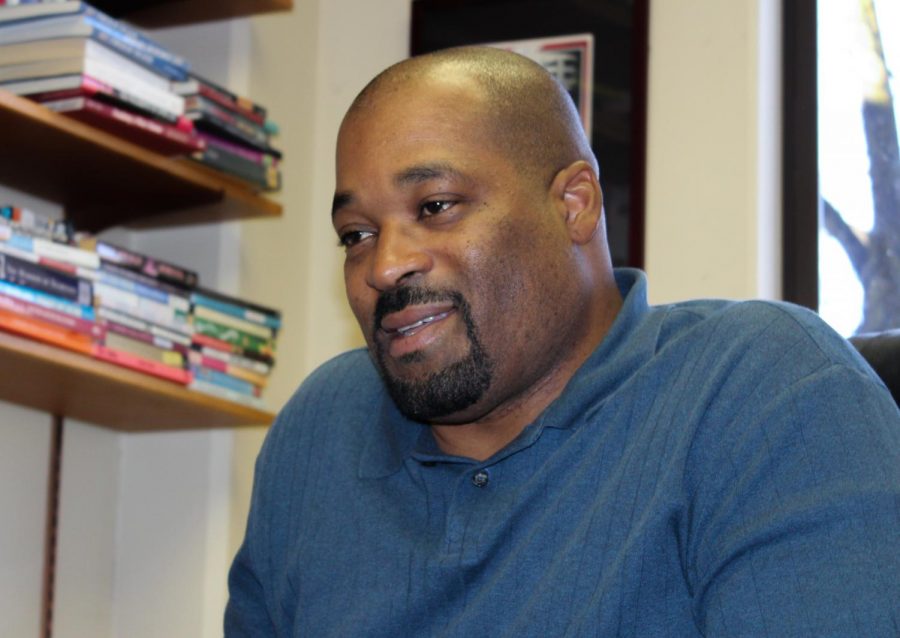Professor writes book on success, wins award
Dissects writings by Baldwin, Morrison on black male protagonists
CHRISTIE HOIUM | THE DAILY EVERGREEN
Aaron N. Oforlea, associate professor in the Department of English, discusses the award he received for his debut book.
October 19, 2018
A WSU professor’s new book exploring the successes of black males in literature has recently won the 2018 Award for Creative Scholarship at the College Language Association (CLA) annual convention banquet.
Aaron Oforlea, associate professor at WSU, published his book “James Baldwin, Toni Morrison, and the Rhetorics of Black Male Subjectivity” in 2017.
Despite his initial lack of interest in awards, Oforlea said he was told repeatedly to nominate his own book for other literary awards. He didn’t nominate his book for any awards, so winning the Award for Creative Scholarship was a shock to him.
“I was just glad the book was over,” Oforlea said. “[Winning awards] just wasn’t on my mind. It was a surprise.”
In order to be considered for the award, a book has to be nominated by someone other than the author. Oforlea said he does not know who nominated his book.
The CLA does not reveal who has been nominated, only the winner when they are announced. The process a book undergoes as it is considered, Oforlea said, is not one he is familiar with.
“I didn’t know I was nominated until I won,” he said. “I don’t think people know if their books were nominated. I didn’t.”
The book is a dissection of multiple writings by prominent black authors James Baldwin and Toni Morrison, he said.
In his writing, he explored how the two writers conceptualized the challenges their black male characters navigated throughout their books, Oforlea said.
“I wanted to know, intellectual curiosity, I guess, what helps us be successful,” he said. “How black men, specifically how these fictional characters, are imagined to be successful by these authors.”
Success, as defined by Oforlea, is the ability to become a better person and better a community all while maintaining a sense of self.
Success can encompass how a person dresses, how a person carries themselves, what a person understands about his or herself and how a person approaches or chooses not to approach a situation, he said.
“You use who you are to your advantage, it’s the way you think,” Oforlea said. “The way you imagine yourself, you have to choose what you are going to do to attain what you want.”
Throughout his book, Oforlea said he periodically mentions what he has dubbed the “discursive divide.”
This describes the chasm separating two contrasting ideas. In one, black men are positioned in opposition to the white society and the white world. In the other, there are the dreams and goals that the man wishes to get to. Crossing that divide without losing personal identity, Oforlea said, is success.
“There is a divide between you and this other place,” he said. “It can be a physical place or a symbolic one. You have to contend with all the ways in which you are defined in order to get to that place, but you don’t leave your identity behind.”
In his book, Oforlea analyzes how Morrison and Baldwin’s black male characters navigate the discursive divide. Each chapter of his book dissects a character from a book written by one of the two authors.
“I wanted to see how those characters cross [the divide] and maintain their sense of self,” he said. “The book is about black male subjectivity.”
Oforlea said that by using rhetorical strategies, he was able to focus on the male characters of each book and take a closer look at the idea of an African-American man being successful.
“Racism exists, it just does,” he said. “The fact that someone is successful, that someone manages to build a life, it does not mean that they didn’t face any racism. It just means that they have done it despite the racism.”
Oforlea said the book expands on more than rhetorical studies. It also involves gender studies in relation to race.
There are different ideas of masculinity and patriarchy, he said. There is also a difference between white patriarchy and black patriarchy, he said, but the two converge in places, especially in regard to the treatment of women.
Oforlea said the dynamics between black male characters and black female characters closely resembled those of white male characters and white female characters.
“This notion of black male patriarchy is just not going to work,” he said. “These characters [have to] define what it means to be a man in non-oppressive ways, what it means to be a black male feminist.”
Oforlea said the writings he based his book on include themes that are still relevant to this day and age. The books are informative and alive, he said, and very enjoyable reads.
“That’s what literature is for,” said Oforlea. “To teach us.”















